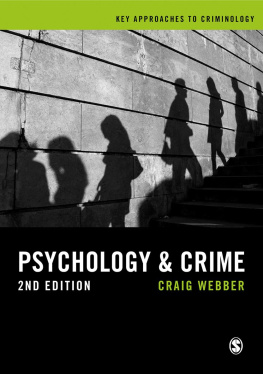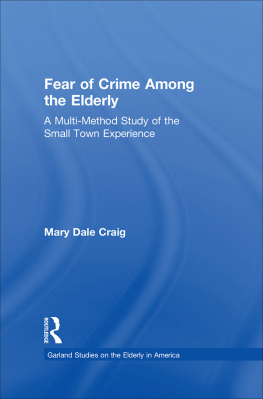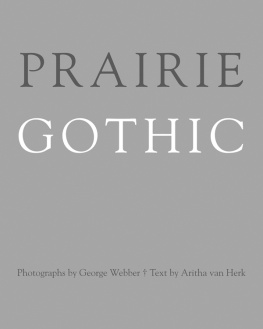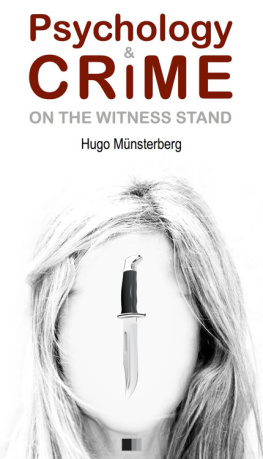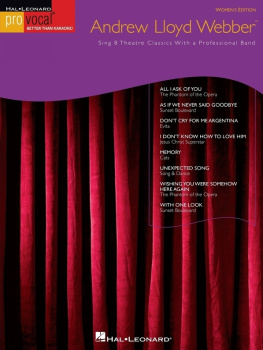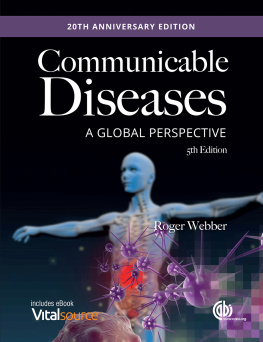Psychology and Crime
Key Approaches to Criminology
Series editor: Yvonne Jewkes University of Bath
The SAGE Key Approaches to Criminology series celebrates the removal of traditional barriers between disciplines and, specifically, reflects criminologys interdisciplinary nature and focus. It brings together some of the leading scholars working at the intersections of criminology and related subjects. Each book in the series helps readers to make intellectual connections between criminology and other discourses, and to understand the importance of studying crime and criminal justice within the context of broader debates.
The series is intended to have appeal across the entire range of undergraduate and postgraduate studies and beyond, comprising books which offer introductions to the fields as well as advancing ideas and knowledge in their subject areas.
Other books in the series
Yvonne Jewkes, Media & Crime, 3rd Edition (2015)
Michael Rowe, Race & Crime (2012)
Roy Coleman and Mike McCahill, Surveillance & Crime (2011)
Gerry Johnstone and Tony Ward, Law & Crime (2010)
Barry Godfrey, Paul Lawrence and Chris Williams, History & Crime (2008)
Marisa Silvestri and Chris Crowther-Dowey, Gender and Crime, 2nd Edition (2016)
Alistair Fraser, Gangs & Crime (2017)
Katja Franko Aas, Globalization & Crime, 3rd Edition (2020)
Psychology and Crime
Key Approaches to Criminology
2nd Edition

- Los Angeles
- London
- New Delhi
- Singapore
- Washington DC
- Melbourne
SAGE Publications Ltd
1 Olivers Yard
55 City Road
London EC1Y 1SP
SAGE Publications Inc.
2455 Teller Road
Thousand Oaks, California 91320
SAGE Publications India Pvt Ltd
B 1/I 1 Mohan Cooperative Industrial Area
Mathura Road
New Delhi 110 044
SAGE Publications Asia-Pacific Pte Ltd
3 Church Street
#10-04 Samsung Hub
Singapore 049483
Craig Webber 2020
First published 2010
This second edition published 2020
Apart from any fair dealing for the purposes of research or private study, or criticism or review, as permitted under the Copyright, Designs and Patents Act, 1988, this publication may be reproduced, stored or transmitted in any form, or by any means, only with the prior permission in writing of the publishers, or in the case of reprographic reproduction, in accordance with the terms of licences issued by the Copyright Licensing Agency. Enquiries concerning reproduction outside those terms should be sent to the publishers.
Library of Congress Control Number: 2018967756
British Library Cataloguing in Publication data
A catalogue record for this book is available from the British Library
ISBN 9781446287422
ISBN 9781446287439 (pbk)
Editor: Natalie Aguilera
Editorial assistant: Eve Williams
Production editor: Sarah Cooke
Marketing manager: Susheel Gokarakonda
Cover design: Wendy Scott
Typeset by: C&M Digitals (P) Ltd, Chennai, India
Printed in the UK
At SAGE we take sustainability seriously. Most of our products are printed in the UK using responsibly sourced papers and boards. When we print overseas we ensure sustainable papers are used as measured by the PREPS grading system. We undertake an annual audit to monitor our sustainability.
For Sarah and Maia
What gets into you all? Weve studied the problem. Weve been studying it for damn well near a century, yes, but we get no further with our studies. Youve got a good home here, good loving parents, youve got not too bad a brain. Is it some devil that crawls inside of you?
Stanley Kubricks A Clockwork Orange, 1971
Psychology and Crime: Towards a Transdisciplinary Perspective
When this book series was first conceived one of its key rationales came from my experience of working in a department where students studied Criminology as one half of a Joint Honours degree. By far the most popular combination was Criminology and Psychology, yet students frequently were unable to make any theoretical or empirical links between the two subjects. Little wonder, really, given that the two subjects were housed in separate buildings, on different parts of the campus, and taught by teams who operated independently. The ambition of the book, then, is to help academics and students make appropriate intellectual connections between these related disciplines, integrating the two subject halves of a Joint Honours degree or team-taught modules.
It is, of course, not just Joint Honours students who sometimes struggle to see the relevance of studying crime and criminal justice within a broader context. It is virtually impossible to study, teach or research in Criminology without dipping into scholarship from Psychology, yet there is often a lack of understanding of psychological and psychoanalytical approaches, and sometimes downright resistance to the contribution of psychologists to our understandings of offending, victimisation, governance, control, and so on. Here is a book that challenges such antipathy; though not before itself subjecting both the discipline and the common myths perpetuated about criminological psychology to critical analysis. Craig Webber provides a lively, erudite and hugely relevant overview of Psychology and Crime, not only introducing readers to the historical contours that have shaped what we know (and what we think we know) about psychological approaches to studying crime and deviance, but also tackling head-on some of the most contentious, contested and urgent issues facing criminologists and criminal justice practitioners in the current epoch. Combining theoretical rigour with practical, familiar examples, students and other readers finally have a resource that will invigorate their understanding of the synergies between the two fields. Not only does Psychology and Crime fulfil the ambitions of the Key Approaches to Criminology series but it is, quite simply, a terrific read.
Yvonne Jewkes
Series Editor
Preface
There is both academic and popular fascination with the criminal mind and violent individuals. The oft-mentioned rationale for students wishing to study psychological approaches to crime is the desire to find out what makes criminals tick. Despite the ease with which you can use the web to search through academic journals and books from many different disciplines to form a more robust understanding of phenomena like crime, the fact is that many researchers stick to their disciplinary traditions and do not look outside of them. By taking the path of least resistance, the overlapping ideas between disciplines like sociology and psychology, as well as the historical continuities, are rendered opaque. This has led to psychology being seen as separate to sociological criminology and divorced from the rich theoretical history that has accrued in this field. This book aims to restore these links. One of the themes of this volume, therefore, is to highlight the already existing, albeit often implicit, psychological elements of criminology. Similarly, I wish to point out the similarities between arguments that emanate from within psychology and sociology and where integration would lead to more robust analysis.



